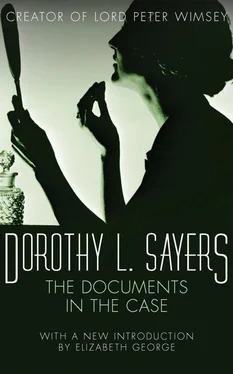I explained that I had only just returned from my honeymoon, and introduced Marlowe to my wife. Marlowe roared approval in his characteristic way, and added:
‘Come along on Friday — same old crowd, you know, and bring this man Lathom. I want to know him. He can paint .’
He spun round to face the picture again, and the crowd retired precipitately to avoid him.
‘Well,’ said a man’s voice, almost in my ear, ‘and how do you think it looks, now it’s hung?’
I spun round and saw Lathom, and with him, before I could adopt any suitable attitude to the situation, Mr and Mrs Harrison, flung up from the waves of sightseers like the ball from a Rugby scrum.
Retreat was hopeless, because Marlowe now had me tightly by the shoulder, while with his other hand he sketched large, thumby gestures towards the portrait to indicate the modelling and brushwork.
‘Hullo, Munting!’ said Lathom.
‘Hullo, Lathom!’ I said, and added nervously, ‘Hullo-ullo-ullo!’ like something by P. G. Wodehouse.
‘Good God!’ exploded Marlowe, ‘is this the man? The man and the model, by all that’s lucky,’ he bellowed on, without waiting for my embarrassed answer. ‘I’m Marlowe; and I say you’ve done a good piece of work.’
Lathom came to my rescue by making a suitable acknowledgement of the great man’s condescension, and I was sliding away with a vague bow and a muttered remark about an engagement, when I felt a tap on the shoulder. It was Harrison.
‘Excuse me one moment, Mr Munting,’ said he.
A row in the Academy would have its points from the point of view of my Press agent, but I was not anxious for it. However, I asked Elizabeth to wait a moment for me, and stepped aside with Harrison.
‘I think,’ said he, ‘I am afraid — that is, I feel I owe you an apology, Mr Munting.’
‘Oh!’ I said. ‘That’s all right. I mean, it doesn’t matter at all.’ Then I pulled myself together. ‘I’m sorry,’ I said, ‘it’s my fault, really. I ought not to have come. I might have known you would be here.’
‘It’s not that,’ he said, determined to face it. ‘The fact is — I fear I did you an injustice that — er — that last time we met. Er — the unfortunate woman who made all the trouble—’
‘Miss Milsom?’ I asked; not because I didn’t know, but to help him on with his sentence.
‘Yes. She has had to take a rest — in fact, to undergo a course of treatment — in fact, she is in a kind of nursing-home.’
‘Indeed?’
‘Yes. There can really be no doubt that the poor creature is — well, demented is perhaps an unkind way of putting it. Perhaps we had better say, unbalanced.’
I expressed sympathy.
‘Yes. From what my wife tells me — and Mr Lathom — and from what I hear from the poor creature’s relatives, I now feel no doubt at all that the — the accusation, you know — was entirely unfounded. A nervous delusion, of course.’
‘Yes, yes,’ said I.
‘I quite understand, of course, your very chivalrous motives for not putting the blame on her at the time. The position was most awkward for you. You might perhaps have given me a hint — but I perfectly understand. And my wife, you will realise, was so very much upset—’
‘Please,’ I broke in, ‘do not blame her or yourself for a single moment.’
‘Thank you. It is very kind of you to take it in this reasonable spirit: I cannot say how much I regret the misunderstanding. I hope you are very well and prosperous. You are quite a famous man now, of course. And married. Will you do me the honour to present me to your wife? I hope you will come and see us some day.’
I was not keen to make the introduction, but it could scarcely be avoided. The preposterous situation was there, and had to be imagined away. Mrs Harrison glowed. For the first time I saw her in full prismatic loveliness, soaked and vibrating with colour and light. I asked her what she thought of the show.
‘We haven’t seen much of it yet,’ she said, laughing, ‘we came straight to see the picture. Is it going to be the picture of the year as they call it, do you think, Mr Munting?’
‘It looks rather like it,’ said I.
‘Fancy that! It does make me feel important — though, of course, I don’t count for anything, really. The painting is the thing, isn’t it!’
‘The subject of the portrait counts for something, too,’ said Elizabeth. ‘I don’t see how anybody can make a picture of one of those cow-faced people. Except a satirical one, of course. It’s the painter’s job to get the personality on the canvas, but what is he to do if there is no personality? Mr Lathom . .’
She looked at the portrait, and then at Mrs Harrison, and something seemed to strike her. It was the thing that had struck me, months before, when I first saw what Lathom had made of it. She grew a little confused, and Lathom struck in.
‘Mrs Harrison and you would agree about the importance of subject-matter,’ he said. ‘I can’t persuade her to admire Laura Knight.’
Mrs Harrison blushed a little.
‘I think they are very clever pictures,’ she said, a trifle defiantly, and with a side-glance at her husband, ‘but they are rather peculiar for a woman to have painted, aren’t they? Not very refined. And I mean, they are so unnatural. I’m sure people don’t walk about, even in their bedrooms, like that, with nothing on. And I think pictures ought to make one feel — uplifted, somehow.’
‘Come, come, Margaret,’ said Harrison, ‘you don’t know what you are talking about.’
‘But you said the same thing yourself,’ she came back at him.
‘Yes, but I don’t care about your discussing them here.’
‘Oh!’ said Marlowe, loudly, ‘you are afraid of the flesh. That is our trouble — we are all afraid of it, and that is why we insist and exaggerate. “ Hoc est corpus ,” said God — but we turn it into hocus-pocus. There’s no hope for this generation till we can see clean flesh and “sweet blood” — Meredith’s phrase — without being shocked at its fine troublesomeness. If one were to strip all these people now’ — he waved a hand at a fat man in a top-hat and an emaciated girl, who caught his eye and stood paralysed — ‘you would think it indecent. But it’s not as indecent as the portrait-painter who strips their souls for you. Some men’s work would be publicly censored, if the powers knew how to distinguish between flesh and spirit — which, thank God, they don’t.’ He clapped Lathom on the shoulder. ‘How about that other thing of yours, my boy?’
Lathom laughed a little awkwardly.
‘Is that the portrait of Miss Milsom?’ I Interrupted, hastily — for I saw trouble coming up like a thunder-cloud over Harrison’s horizon. ‘We must go and have a look at it. You’re doing pretty well to have two pictures in such a crowded year. We mustn’t keep you too long. Which room is it in, Lathom?’
He told us, and when we had said our farewells, pursued us into the next room.
‘I say, old man,’ he whispered breathlessly, ‘I couldn’t really help this. Couldn’t in decency get out of it, could I?’
‘No,’ said I, ‘I suppose you couldn’t. It’s not my funeral, anyhow.’
‘It’s the first time we’ve met,’ he went on, ‘and it will end here.’
‘But for my damned interference it wouldn’t have begun here,’ I answered. ‘I’m not blaming you, Lathom. And I’ve really no right to make conditions. I don’t think it’s wise — but I can’t set up to be a dictator.’
‘Oh, you admit that, do you?’ said Lathom. ‘I’m rather glad to know it.’ He hesitated, and added abruptly, ‘Well, so long.’
I was thankful to see the end of the episode. From every point of view it seemed advisable to drop all connection with Lathom and the Harrisons, and I saw none of them again until the 19th of October.
Читать дальше












